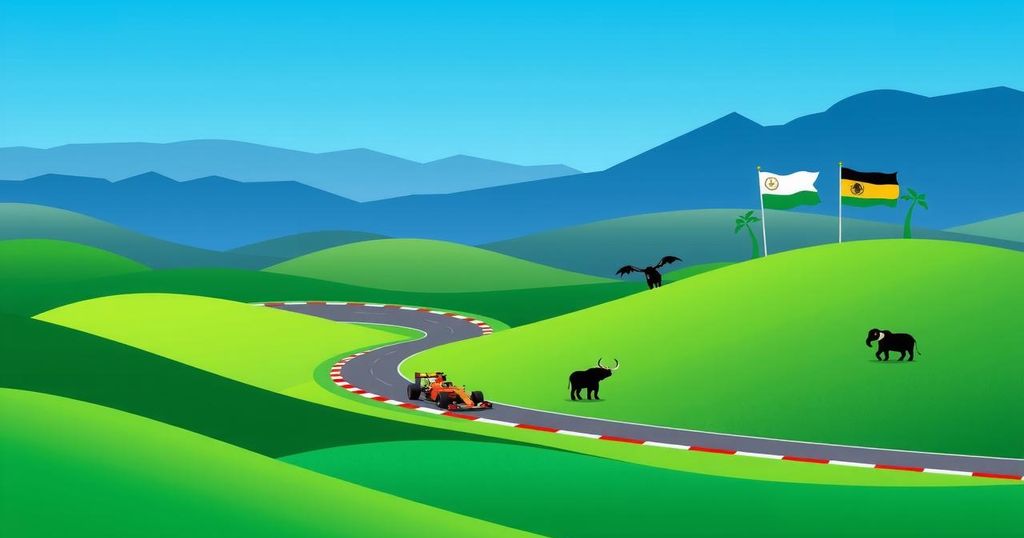Rwanda and South Africa Compete to Reintroduce Formula 1 to Africa
Rwanda and South Africa are in a competitive bid to host Formula 1 in Africa by 2027, after a 30-year hiatus. Rwanda emphasizes sustainability with a new circuit designed to showcase its landscape, while South Africa relies on its historical Kyalami circuit. Both face challenges of significant financial investment and criticism related to broader issues like human rights.
The pursuit of bringing Formula 1 back to Africa has intensified, with Rwanda and South Africa emerging as key competitors. Both nations aspire to host a grand prix by 2027 after a three-decade absence of the sport on the continent. Lewis Hamilton, a seven-time world champion, has long supported an African grand prix, with fellow racers like Max Verstappen and Lando Norris expressing enthusiasm for the idea.
Rwanda presents a comprehensive vision that intertwines motorsport with sustainability and scenic landscapes. President Paul Kagame announced the country’s bid in December 2022, backed by FIA president Mohammed Ben Sulayem, who emphasizes that “Africa deserves a F1 event and Rwanda is the best place”. In contrast, South Africa boasts an established history in F1, with a built circuit in Kyalami that hosted numerous races between 1967 and 1993.
Rwanda aims to develop a Formula 1 circuit near Kigali, featuring a design by Alexander Wurz which takes advantage of the country’s hilly terrain and promises an engaging track for drivers. The planned project, estimated to cost over $270 million, aims not only to host F1 but also to enhance the tourism sector, which has shown significant financial returns. Chief tourism officer Irene Murerwa elaborates on the national benefits of hosting the event, stating, “The benefits trickle down to every Rwandan.”
Despite the ambitious plans, Rwanda faces criticism of “sportswashing” amid claims regarding human rights violations. Nevertheless, officials contend that these concerns detract from Rwanda’s growth and achievements on the world stage. FIA president Ben Sulayem argues that criticism arises from opposition rather than legitimate concerns, asserting, “When people cannot get what they want they always blame it on sportswashing.”
In South Africa, the government actively endorses the F1 bid, with sports minister Gayton McKenzie highlighting the potential economic boost from hosting such an event. The country’s established circuit facilitates a more financially feasible proposal, requiring fewer upgrades compared to constructing a new facility. Minister McKenzie affirms the anticipated tourism influx, commenting, “F1 will have the same effect – it will create jobs, boost tourism, and showcase South Africa to the world.”
Both nations face considerable challenges, including substantial race promotion fees ranging from $15 million to $50 million annually, as well as ongoing track maintenance costs averaging $18 million. Nevertheless, irrespective of which country is selected, the return of Formula 1 to Africa promises to mark a significant occasion, highlighting both historical legacies and futuristic opportunities for the continent.
Formula 1 has not taken place in Africa for over thirty years, leading to an increasing push from nations like Rwanda and South Africa to secure a grand prix. The presence of influential drivers advocating for the return of F1, combined with administrative and infrastructural supports in both countries, underscores the significance of this goal. As both nations prepare their bids, they simultaneously address concerns associated with investment and sustainability while seeking to enhance their global image through hosting high-profile sporting events.
In conclusion, the race to host Formula 1 in Africa is marked by competitive bids from both Rwanda and South Africa, each with unique advantages and challenges. Rwanda emphasizes sustainability and innovative design, while South Africa leans on its existing historical significance in F1. Regardless of who ultimately secures the grand prix, the project’s realization could establish a pivotal moment for African motorsport and tourism prospects.
Original Source: www.bbc.com




Post Comment